




DIFC’s Salmaan Jaffery outlines Dubai’s importance in private markets, supported by regional wealth and a developed ecosystem. Highbrook’s Nick Smith reflects on ADGM’s first decade, transforming into a thriving funds centre anchored by sovereign wealth and now expanding to meet demand. Emmanuel Givanakis of ADGM FSRA highlights the jurisdiction’s appeal for hedge funds, citing progressive regulation, sustainable finance and a maturing ecosystem. Dentons’ Owen McLennan and Anna Terrizzi examine how DIFC and ADGM are shaping private credit regimes, while Marex’s Mazen Najjar points to the realities of hedge fund launches in the Gulf, where credibility and relationships matter as much as performance. Greenstone’s Alex Gemici stresses the UAE’s growing importance for global fund managers seeking alternative pools of capital. PwC’s Christine Cairns explores deepening UAE–UK wealth corridors, while Black Swan’s Richard Aldridge notes how private credit growth is reshaping talent needs across the region. In Letter from America, Prosek Partners’ Mark Kollar examines Washington’s push to widen access to alternatives. In our op-ed, Ovata Capital’s James Burdett argues retail investors face a game they cannot win.



August markets were finely poised, surging to record highs only to retreat just as quickly, as investors weighed the looming prospect of rate cuts, renewed trade tensions and increasingly complex political risks (see market review). Despite the volatility, by month-end nearly all hedge fund strategies had posted gains, with the HFRI Fund Weighted Composite Index advancing 2.3%.
Equity Hedge strategies led the way, with the HFRI Equity Hedge (Total) Index up 3.3%. The standout sub-strategy was the HFRI Multi-Strategy Index, which surged 7.6%. Healthcare rose 4.1%, Fundamental Growth gained 3.8%, while Technology managers lagged with only a 0.5% rise.
Event-Driven strategies also advanced, with the HFRI Event-Driven (Total) Index up 2.0%, driven by Activists gaining 4.2% and Multi-Strategy rising 2.3%.
Macro strategies gained 1.5%, with Discretionary and Systematic managers advancing 2.2% and 1.7%, while the Currency Index slipped 0.6%.
Relative Value strategies gained 1.1%, led by Fixed Income Convertible Arbitrage and Fixed Income Sovereign indices, both up 1.5%.
Regionally, China outperformed with a 6.5% gain, taking year-to-date returns to an impressive 16%. Asia ex-Japan followed with a 5.1% rise. North America was up 2.6%, while Western/ Pan Europe edged higher 0.3%. India was the outlier, slipping 0.6% in August and is now down 2.0% yearto-date.

Stone Point Capital closed its tenth flagship fund, Trident X, with total commitments of $11.5 billion, surpassing the original $9 billion target. The Greenwich-based private-equity firm invested approximately $750 million of its own capital, while existing investors reinvested at an impressive 88% rate, with new global investors contributing around $3 billion. Trident X started deploying capital in May 2025, with its first transaction being the acquisition of Ultimus Fund Solutions. Trident X is roughly $2.5 billion larger than Trident IX, its predecessor launched in 2022 at $9 billion. This new fund follows a strong year in which Stone Point returned $8.5 billion to investors.
Neuberger Berman’s closed NB Strategic Co-Investment Partners V, securing approximately $2.8 billion in commitments, well above its $2.25 billion target. The close bolsters the company’s coinvestment platform to over $40 billion in dedicated capital. The fund is designed to participate alongside leading private equity sponsors in direct equity deals globally. Including this fundraise, Neuberger has amassed approximately $6 billion in co-investment capital since January 2024, underscoring strong institutional demand for its GP-centric investment strategies.
Coller Capital closed Coller Credit Opportunities II (CCO II), a private credit secondaries fund at $6.8 billion, surpassing its predecessor’s $1.4 billion close in 2022. The London-based firm plans to deploy approximately $5.8 billion toward acquiring senior, performing loans from both GP-led and LP-led vehicles. This fund size represents a significant increase from CCO I, highlighting Coller's enhanced capacity in the rapidly expanding credit secondaries market. Already, the fund has backed deals such as American National Insurance’s $1.6 billion portfolio and Abry Partners’ continuation vehicle. The $6.8 billion close underscores growing investor demand for liquidity-oriented, defensive private market strategies.

(cont.)
Haveli Investments announced the final close of its debut fund, Haveli Software Fund I, at $4.5 billion, exceeding its $4.25 billion target. The Austin-based firm, founded by former Silver Lake executive Brian Sheth, is targeting enterprise software businesses and growth-
stage opportunities, aiming to combine operational support with long-term capital. The fund’s close positions Haveli as one of the most prominent new entrants in tech-focused private equity.
New Mountain Capital raised $3bn in a continuation fund to extend its ownership of Real Chemistry, a healthcare communications platform. The deal gives existing LPs the option to cash out or roll over, underscoring yet another use of GP-led secondaries as a liquidity tool. It also reflects the growing role of continuation vehicles in helping sponsors retain high-conviction assets while providing flexibility to investors.
BlueFive Capital has raised $2bn for its debut growth equity fund, targeting mid-stage technology and consumer companies. Founded by former executives from Insight Partners and TPG Growth, the firm aims to bridge the gap between venture and buyout capital, offering flexible deal structures and minority stakes. The successful close underscores sustained LP appetite for crossover strategies.


In a sign of sport’s growing appeal as an asset class, Apollo Global Management, Inc. is launching a $5 billion fund to channel capital into teams, leagues and clubs. The initiative, first reported this morning by the Financial Times, will combine credit provision to leagues and teams with equity investments in clubs, signalling Apollo’s intent to scale up in a rapidly expanding market. The move highlights how quickly sport has become a magnet for private capital. Apollo has already tested the waters with an £80 million loan to Nottingham Forest secured against its stadium and a £40 million facility tied to racehorses and stables linked to agent Kia
Joorabchian’s Sports Invest Holdings. With competitors such as Ares Management Corporation and CVC securing stakes in La Liga, the Six Nations and Chelsea FC, Apollo’s new fund adds fresh momentum to an increasingly competitive arena. Underlying this surge are the broadcast rights, sponsorships, merchandising and global fan engagement, all of which generate reliable revenues that often resist wider market cycles. As clubs seek flexible financing for infrastructure and talent, institutional investors see an opportunity for private-equitystyle returns in a sector once beyond their reach.

Carlyle is starting to see good progress, with stronger quarterly fee income and assets under management rising to $465 billion, reflecting the leadership of Harvey Schwartz. The FT notes that half of the analysts covering Carlyle now rate the stock a "buy," citing rising investor confidence. In the firm’s Q2 results, Schwartz stated, “momentum across the whole platform feels good,” citing improved fundraising, execution, and a steadier market backdrop.
We’ve been tracking Apollo AUM growth over the past few years as it chases down Blackstone. Their second-quarter earnings, for the period ended June 30 2025, delivered a strong performance: AUM surged to $840 billion, up 21% year-on-year, driven by $61 billion in net inflows. Fee-related earnings hit a record $627 million, rising 22%, backed by robust
The rise of the retail investor has been hailed as a triumph of financial democracy. No longer are Wall Street elites the only ones with access to markets: anyone with a smartphone can trade at the tap of a screen. Indeed, retail now accounts for around 20% of US equity flow, and apps like Robinhood in the US, or FUTU and eToro abroad, promise to ‘level the playing field.’ What was once the preserve of professional investors and institutional giants has been reframed as an accessible pastime, potentially drawing in millions of new investors worldwide.
The GameStop saga of 2021 briefly turned small investors into folk heroes battling Wall Street titans. Yet less attention was given to the millions of dollars lost as the stock inevitably crashed back to Earth. It made for a neat David versus Goliath tale, one the brokers and the press eagerly amplified; but the truth is that the playing field remains tilted. In reality, David really cannot win.
origination volumes and capitalraising strength. While still short of Blackstone’s $1.21 trillion, Apollo’s growth rate and inflows suggest the big just keep getting bigger. CEO Marc Rowan pointed to the firm’s disciplined model, record inflows, and origination power as the drivers behind its trajectory — all signs that Apollo is moving decisively in the right direction.
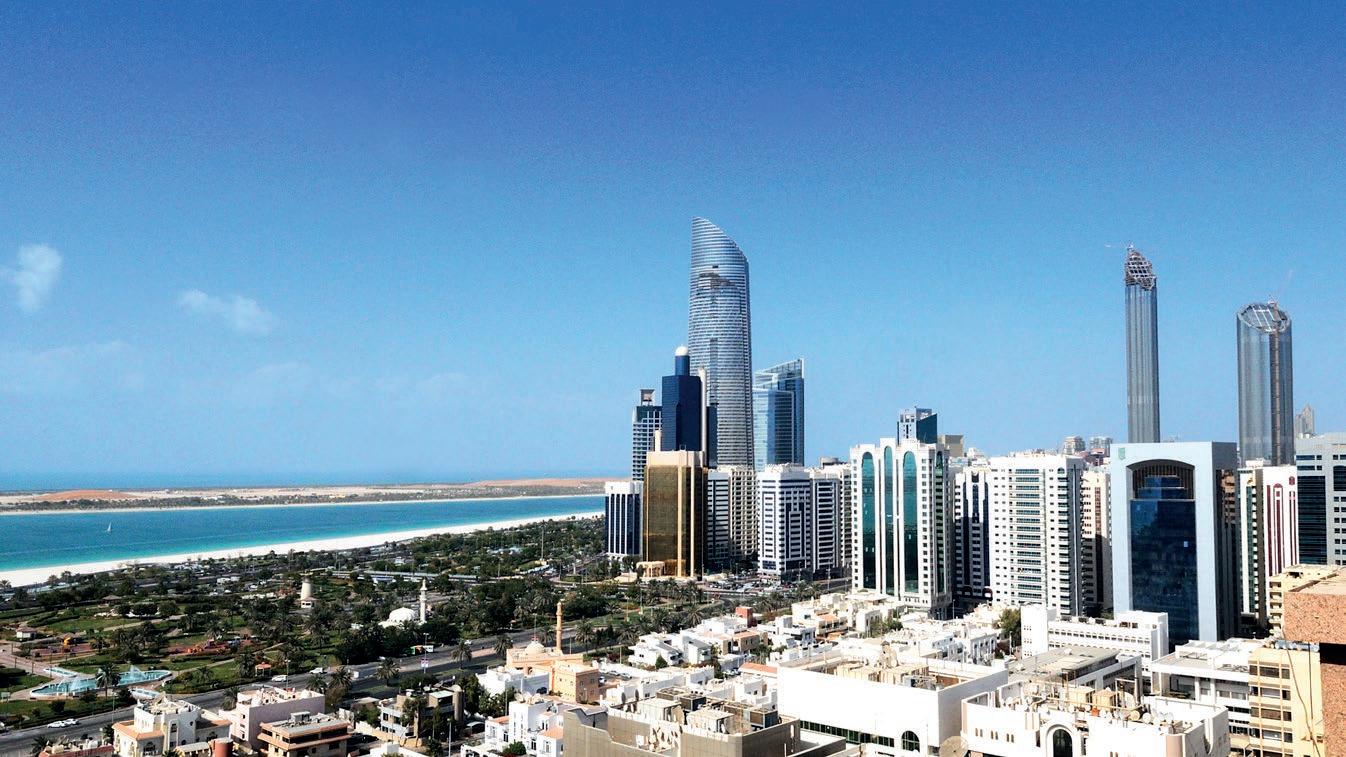
Brokers proudly advertise near-zero commissions but are less than transparent about how they actually make money. Net interest income on idle cash, margin lending, stock lending and account sweeps generate sizeable profits for platforms, profits that come at the expense of their users. Payment for order flow, or more bluntly marketmaker kickbacks, are another lucrative channel.
These arrangements only exist because the market makers themselves profit from pricing advantages, meaning retail is losing out. The creep of gambling firms into retail trading further blurs the line between investing and speculation, stripping the sheep’s clothing from the wolf.
Invariably this means that the ability for retail investors to outperform is stacked against them before the more traditional problems are highlighted, such as lack of live-time data, news flow, emotional decision making, portfolio diversification, etc. In 2024, the average US retail investor generated returns of just 6%-8%, according to research from the JPMorgan Chase Institute, compared with the S&P 500's ~23%.
As governments across the globe continue to open-up access to a greater range of products and assets to retail investors, maybe investors would be wiser to just buy those providing these platforms - the biggest winners for now - or trust the professionals.
James Burdett, Senior Portfolio Manager, Ovata Capital
The views expressed are solely those of the author and do not represent the opinions of their employer, affiliated organisations, or The Alternative Investor.

Having raised a record $20 billion for AlpInvest Secondaries Program VIII, Carlyle Group has nearly doubled the size of its predecessor and cemented secondaries as its fastest-growing business line.
The package includes $15 billion for the flagship fund, $3.2 billion of co-investment commitments, and $2 billion from private wealth vehicles aimed at high-net-worth investors. This haul not only hit the hard cap but also
underscores Carlyle’s pivot toward liquidity-providing strategies at a time when IPOs and trade sales remain subdued.
The momentum in this space reflects the wider market dynamics: mounting $3–3.6 trillion backlog of ageing private equity stakes has created strong demand for secondary solutions, giving firms like Carlyle a prime role in recycling capital.
AlpInvest’s scale has already fed
Abu Dhabi’s Lunate is set to take a minority stake in Brevan Howard while committing $2 billion to a new investment platform, underscoring the emirate’s rising firepower in global alternatives. For Brevan, the tie-up brings both fresh capital and closer alignment with one of the Middle East’s most ambitious investment groups.
This deal reflects Abu Dhabi’s long-term commitment to asset management, with Lunate emerging as a central force in shaping the region’s investment landscape. Bloomberg notes that Brevan already manages around $10 billion from its base in Abu Dhabi Global Market, underlining both the scale of its presence and the emirate’s growing role as a financial hub.
Launched in 2023 with backing from key Abu Dhabi entities, Lunate has fast become one of the city’s most powerful financial platforms. The move also mirrors a wider trend as leading hedge funds and alternative managers broaden ownership structures and deepen alliances with sovereign wealth–backed investors.
through to financial performance, with distributable earnings from the unit doubling in the first half of 2025 and overall AUM rising 15%.
The strong fundraising, coupled with robust deployment opportunities, has helped fuel a rally in Carlyle’s share price this year with secondaries a cornerstone of its future growth.
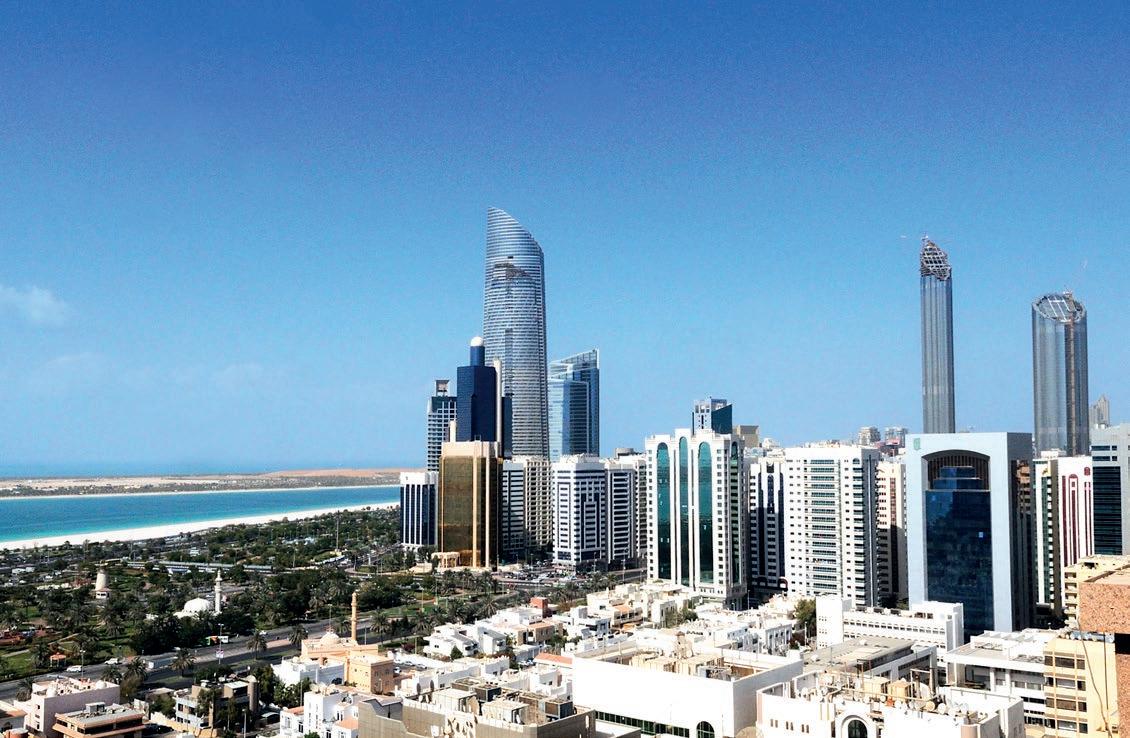
There’s no let-up in multi-manager hedge funds allocating large sums to external launches, reinforcing their strategy of tapping specialist talent, although some critics say they are drifting towards becoming funds of funds.
One of the most significant recent developments came as Bloomberg reported that Millennium Management
has committed $1 billion to Qin Xiao’s new Singapore-based Nexus Commodities Capital Management. Qin, a 22-year veteran of Goldman Sachs and former co-head of global commodities trading, will run a discretionary strategy focused on global energy and resource markets.
Millennium has recently made other sizeable commitments to Helix
Partners, Scopia and Centerline Investment Management, among others.
The scale of these deals underscores how multi-managers are increasingly leveraging their resources to secure access to specialist talent beyond their own walls
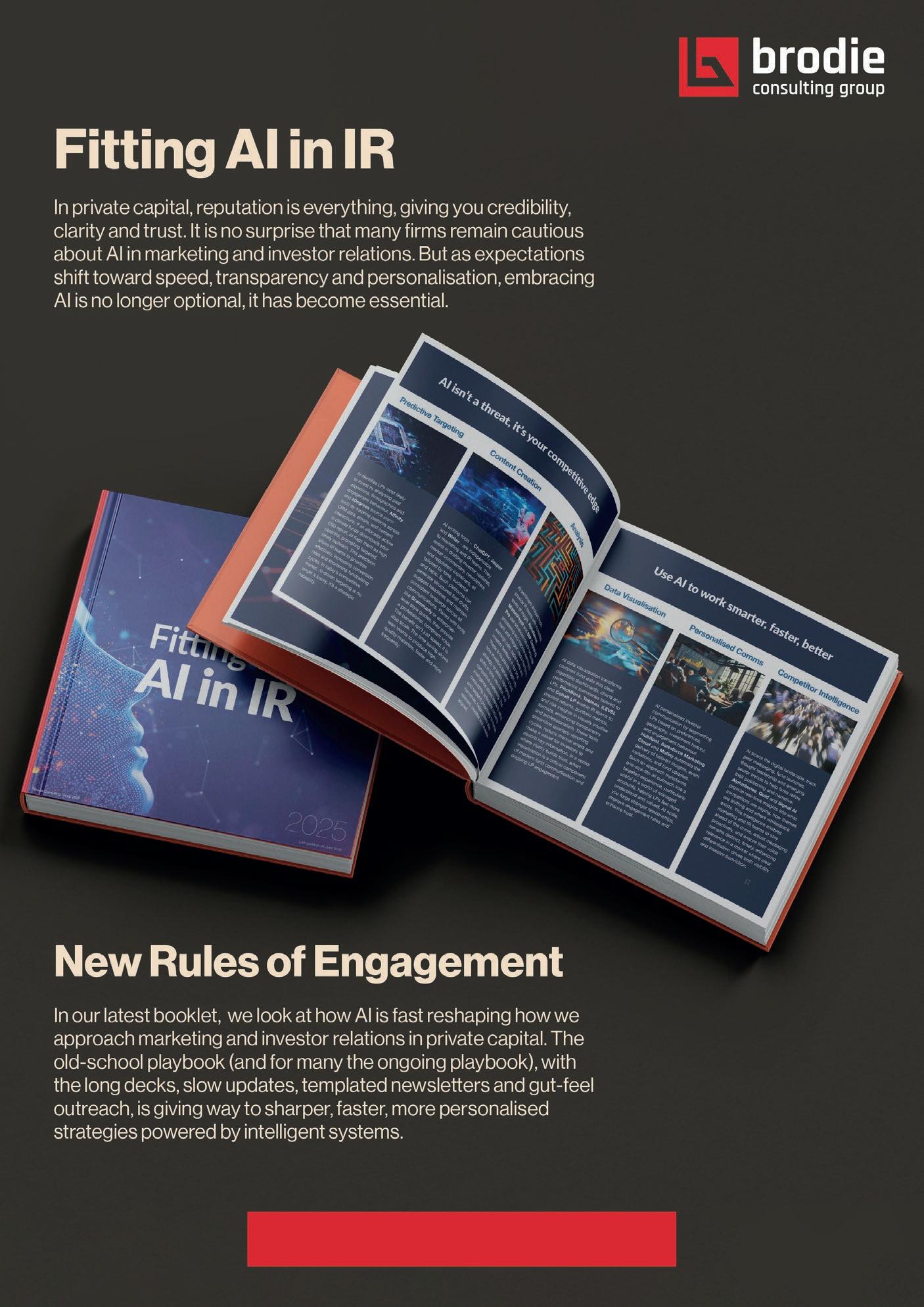


Former Viking Global CIO Ning Jin is set to launch Avantyr Capital, a long-short equity fund targeting an initial $1 billion in assets. According to recent regulatory filings, the firm has a 19-person team (including 10 investment professionals), based in Manhattan. Avantyr will focus on the technology, media, telecoms, consumer, financials, and industrials sectors. The firm derives its name from the Italian word “avanti,” meaning “forward” or “ahead,” and marks the latest spin-out from Viking’s infrastructure.
Scale-driven consolidation is increasingly defining the hedge fund landscape, with Qube Research & Technologies planning to merge its Torus and Prism funds into a single $20 billion pool by December 2025, writes Bloomberg.
The London-based quant firm, which managed approximately $28 billion as of March 2025, stated that the move is intended to enhance liquidity management, streamline operations, and accelerate capital
Tougher non-compete clauses are becoming a feature of the private capital industry, with investment staff at major firms facing longer restrictions before they can join rivals. In February 2025, Man Group extended its non-compete periods, a move that Costas Mourselas, of the Financial Times, writes has proved deeply unpopular internally, with some employees already exploring opportunities elsewhere. The firm’s chief people officer defended the policy as consistent with industry norms at a time of fierce competition for talent. The change marks a sharp departure from Man’s traditionally
flexible and collaborative culture and follows a difficult year for the firm's quant strategies. Man’s shift also mirrors similar measures across the sector. Citadel, for instance, has lengthened certain non-compete periods to about 21 months - well beyond the usual one-year standard - while also benefiting from new Florida legislation that allows restrictions of up to four years for high earners. Such moves highlight a broader industry trend to lock in talent, even as they risk sparking discontent and attrition among top performers.
deployment across its strategies. Such a shift mirrors that of industry peers, who have leaned into multistrategy vehicles in recent years. Citadel and Millennium, for instance, expanded their central pools during 2023–2024, highlighting the benefits of scale in execution, risk control, and investor access. For Qube, one of Europe’s largest quant hedge funds, the merger underscores its push to compete more directly with these giants.


Back to it after an August that was anything but a lazy slumber at the end of summer, thanks in part – at least to the close alt watchers – to new developments (and ongoing debates) around private markets and US retirement funds.
So first a quick review: Until recently, only certain target-date or asset-allocation funds could incorporate alternatives as an investment option if they met certain ERISA fiduciary standards. The practice is by no means widespread or direct.
However, last month, President Trump signed an executive order called “Democratizing Access to Alternative Assets for 401(k) Investors,” which in short is designed to reduce barriers for private-market managers so they can more easily offer private equity and other alt investments to defined-contribution plans – a walloping $12-trillion market.

investments in retirement plans. (It increases substantially to 78 percent of advisors who work with pension or defined-benefits plans and 43 percent of advisors overall, which indicates momentum.)
And the biggest benefits the advisors claim?
Diversification, higher returns, lower correlation to the public markets.
With a door to a new market cracked open, the product-framework machines and retail tutorials are full speed ahead.
To be clear, the order does not change any existing regulations. Instead, it sets up a specific review process with the intent of broadening the opportunity through further guidance from government agencies. After all, pension funds have been investing in PE for quite some time, so some retirees have already been indirect investors.
With a door to a new market cracked open, the product-framework machines and retail tutorials are full speed ahead. And as to be expected, the executive order set off a stack of articles offering differing predictions on the order, from “about time” to “caveat emptor.”
A recent survey sheds a bit of light on one side of this debate. According to Empower, the retirement behemoth, in a July poll of financial advisors, approximately 68 percent said they use privatemarket investments in their “wealth-advised or high-net-worth accounts.” That includes private equity, private real estate and private credit. What’s more, some 58 percent of those advisors said they would recommend private-market
But not everyone is all in. Detractors cite a lack of liquidity (longer hold periods with money tied up more than may be desired); higher fees (above lowindex funds) and a need for greater performance to match traditional investments; and a complex landscape (less disclosure, more opaque markets) as their list of concerns. All are valid points, but education, regulatory clarity and product innovation can alleviate them in time, proponents say. And certainly, adding further doubt are recent PE returns, which have been lagging the explosive stock market for the past three years, lending credence to the “follow-the-money” argument. But over the long haul, private equity returns vastly outperform public equity.

Is this a move by advisors and asset owners for profit or a move to better serve investors?
“As regulatory guidance develops, we see advisors playing a pivotal role in helping plan sponsors evaluate private investment options,” said Edmund F. Murphy III, President and CEO of Empower. “Professionally managed accounts and prudent exposure limits can help mitigate risk while offering retirement savers access to a broader investment universe.” His survey showed that 66% of advisors said that greater ERISA/regulatory clarity would increase their likelihood of recommending private markets in retirement plans, a good sign for an “all systems go” once the policy environment takes shape and product frameworks set. The alternative race continues!
Mark Kollar Partner, Prosek Partners

Salmaan Jaffery, Chief Business Development Officer, DIFC Authority
The global financial landscape is entering a new era, one which demands a rethinking of traditional approaches to capital formation and investment. Private markets are redefining the rules of global investing and emerging as the new frontier for capital allocation.
This shift is not happening in isolation. Global private wealth, now exceeding USD 470trn, is increasingly mobile, scanning the globe for jurisdictions that offer stability and opportunity.
Dubai has emerged as the destination of choice for wealthy individuals, family offices and private capital investors. The emirate has the highest concentration of private wealth in any Middle Eastern city – it is home to 81,200 millionaires, 237 centimillionaires and 20 billionaires – which reflects its growing influence in global finance. This has helped to create the region's largest wealth and asset management cluster within DIFC

– the only financial centre in the region operating at scale across all financial services sectors. Today, the Centre is home to 440 wealth and asset managers, including 85 hedge funds, 69 of which are larger than USD 1bn.
The latest report in DIFC’s flagship Future of Finance series titled ‘The Shift to Private Capital: The new private wealth hubs’ offers exclusive insights into the structural shift in capital formation, exploring the growing preference for private markets over public markets.
Public markets, once the backbone of global finance, are shrinking in size and influence, constrained by regulatory burdens and short-term pressures that stifle innovation. In contrast, private markets are gaining traction, offering uncorrelated, consistent, and often superior returns that appeal to a growing pool of investors, including wealthy individuals and family offices.

As Western economies face slower growth, emerging markets are stepping into the spotlight, powered by accelerated economic growth and bold investments in infrastructure and innovation.
Salmaan Jaffery, DIFC Authority



... Dubai's ascent as a global hub for private capital is backed by its unique blend of developed market discipline and emerging market dynamism.
As Western economies face slower growth, emerging markets are stepping into the spotlight, powered by accelerated economic growth and bold investments in infrastructure and innovation. These regions, from the Gulf to East Asia, are rolling out investor-friendly reforms, creating the ideal environment for private capital to thrive.
Against this backdrop, Dubai's ascent as a global hub for private capital is backed by its unique blend of developed market discipline and emerging market dynamism. With the region’s most proven legal and regulatory framework, enduring stability, world-class infrastructure, and commitment to innovation, Dubai continues to attract capital and talent from across the globe.
Another key factor impacting the reallocation of capital, is the ‘Great Wealth Transfer’, with USD 124 trillion expected to be passed down to the next generation. Younger investors are prioritising sustainability, innovation and impact-driven investments, and private markets align well with their priorities, offering opportunities for meaningful impact and superior returns.
The report further explores the evolving strategies of institutional investors, wealthy individuals, family offices, and wealth managers
in adapting to the new financial landscape. It provides insights into thematic investing, the role of private markets in shaping innovation and resilience, and the importance of aligning longterm capital with strategic visions.
In conclusion, Dubai stands ready to meet the demands of a rapidly changing world, as it embraces the forces reshaping the future of finance. Its growing pool of deployable private wealth presents an unparalleled opportunity for the financial services industry. Supported by the institutional density and strategic infrastructure of DIFC, the region’s largest regulated financial services ecosystem, Dubai remains uniquely positioned to help global investors seize emerging opportunities.
Read the full report here

Salmaan Jaffery, Chief Business Development Officer, DIFC Authority

Nick Smith, Co-Founder and Managing Director, Highbrook Capital Consultants
Acentury ago, Al Maryah Island, named after the Arabian deer that once inhabited the region, was home to pearl-diving and fishing. By 2007, when I first came to the UAE as an Allen & Overy (now A&O Shearman) investment funds partner, it had become a modest hub for the local oil and gas industry. All was to change. As part of ‘Plan Abu Dhabi 2030’ and its aim to reduce reliance on oil-based industries, the Abu Dhabi Government had just announced its intention to transform the island into a world-class central business district.
The project was officially given the green light five years later. Gleaming grade-A office towers, the Galleria Mall, the Rosewood and Four Seasons hotels, and the Cleveland Clinic all emerged from the massive redevelopment site. What is now Abu Dhabi Global
Market (ADGM) Square became the nucleus of the island’s financial district. Launched on 21 October 2015, the ADGM is the UAE capital’s ambition to host one of the world’s leading international financial centres. The Emirate has had some catching-up to do. Some ten years earlier, its neighbour Dubai stole a march, establishing its own financial hub, the DIFC.
Yet the ADGM’s trajectory has not been one of mere imitation – it is able to differentiate itself from the DIFC, not least by wealth. ‘Abu Dhabi Inc.’, the Government of Abu Dhabi’s collection of state-owned enterprises, includes vast sovereign wealth funds seeded from the lion share of the UAE’s oil and gas resources. Major investors in the global public and private markets, they have established investment funds and fund and asset managers in Al Maryah Island. The ADGM offers the regional and international asset management industry


A century ago, Al Maryah Island, named after the Arabian deer that once inhabited the region, was home to pearldiving and fishing.
Nick Smith, Highbrook Capital Consultants

the opportunity to be an integral part of the rich, new eco-system. Whereas once this sovereign wealth was serviced on a ‘fly in/fly out’ basis, this model has been significantly modified with permanent teams now being located on-the-ground.
Aside from the lure of proximity to Abu Dhabi Inc.’s deep pockets, the ADGM provides a ‘user-friendly’ and familiar legal and regulatory framework for the international investment funds industry. It is the only financial centre in the region with English common law directly applied within its jurisdiction. This sits alongside a stable, low-tax environment. Further, the centre has been nimble and innovative with several ‘market firsts’ for the region and UAE, such as private REITs, a calibrated venture capital framework for fund managers, foundations and private credit funds.
All this has led to impressive growth in the ADGM’s funds industry. The early mover from Abu Dhabi Inc., sovereign wealth fund Mubadala, with its funds and their managers being some of the first to be established there, now rubs shoulders on Al Maryah Island with the likes of Brevan Howard, Blackstone, Lone Star, BlackRock and Apollo, to name but a few. At the end of Q1 this year, close to 150 asset and fund managers were
located in the ADGM, with almost 200 funds managed from there. As testament to this success, the original gleaming towers on Al Maryah Island have become full. The financial centre’s jurisdiction has therefore recently been expanded to include another island, Al Reem, and with it 500,000 sq m of shimmering new office space.
A decade since its launch, the bold ambition of the ADGM is fast becoming a reality. From ancient deer park to cutting-edge funds hub - for my part, it has been, and continues to be, truly thrilling to witness.

Nick Smith, Co-Founder and Managing Director, Highbrook Capital Consultants
Nick Smith is the former head of Allen & Overy’s Middle East Investment Funds Group (now retired). He has worked and lived in the UAE for over 15 years. Nick has been at the forefront of the development of the Middle East investment funds market and has been involved in many ‘market
Managing Director of Highbrook Capital Consultants, Nick is a consultant to the funds industry, nonexecutive director and mentor.


...Mubadala, with its funds and their managers being some of the first to be established there, now rubs shoulders on Al Maryah Island with the likes of Brevan Howard, Blackstone, Lone Star, BlackRock and Apollo...
Nick Smith, Highbrook Capital Consultants



When we think about the UAE, the UAE provides an opportunity to attract the world's best talent, build regionally, scale globally, and we have about a dozen companies that have more revenues in the US or Europe than in the region, all based in the UAE.
Noor Sweid, Founder & Managing Partner of Global Ventures


Emmanuel Givanakis, CEO, ADGM Financial Services Regulatory Authority
ADGM has rapidly emerged as a leading international financial centre, attracting a growing number of renowned global fund managers. This growth is driven by ADGM's comprehensive, robust and progressive regulatory framework, including fund management and fund structures, which is aligned with international regulatory standards.
The combination of ADGM's progressive regulatory framework and strong investor base have driven the rapid growth of a thriving funds ecosystem in the ‘Capital of Capital’. Core to Abu Dhabi's broader vision for economic diversification, this ecosystem now includes the full scope of fund managers, custodians, advisers, and fund administrators.
ADGM’s attractiveness is illustrated by its growth as a hub for international hedge funds. Recently major international players [such as Brevan Howard, TCI and Marshall Wace] have established in the jurisdiction. Abu Dhabi’s status as the ‘Capital of Capital’ is a particular pull factor, being home to Sovereign Wealth Funds managing a combined $1.5 trillion assets, major family offices and a significant population of high-net-worth individuals. Hedge Funds are also attracted by the time zone advantages, with the UAE’s geographical position enabling seamless trading across Asian, European, and North American markets.




Our commitment to providing a world-class regulatory environment that aligns with international standards has been a key driver in attracting international fund managers to ADGMs.
A bespoke venture capital framework has also provided a conducive environment for a growing VC ecosystem. The regulatory framework for VC firms is both robust and innovative, with ADGM also providing thriving startup ecosystem thanks to the establishment of Hub71, a global tech ecosystem that has attracted over 370 startups from around the world.
A standout feature of ADGM's framework is the introduction of green and climate transition funds. Designed to facilitate the transition to a low-carbon economy, it makes ADGM an attractive destination for managers of sustainability-focused funds and underscores ADGM's commitment to supporting environmentally responsible investing.
Abu Dhabi offers a compelling proposition beyond its financial and regulatory advantages. It is one of the safest cities in the world, providing a secure environment for businesses to thrive. Abu Dhabi’s family-friendly environment is a major
attraction for international businesses, offering world class lifestyle, education and healthcare options, making it an ideal place for professionals and their families to settle. These are particularly important considerations for firms when establishing a long-term presence in the region.
Emmanuel Givanakis, CEO of ADGM’s Financial Services Regulatory Authority stated, "Our commitment to providing a world-class regulatory environment that aligns with international standards has been a key driver in attracting international fund managers to ADGM. We are dedicated to fostering a progressive and innovative financial ecosystem that cultivates its growth and success, and that of its stakeholders."
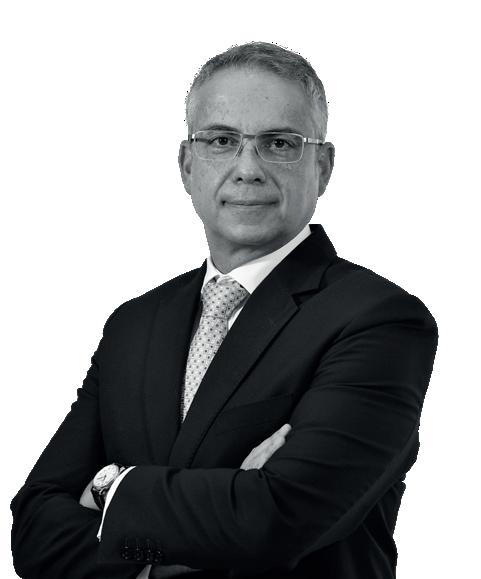
In conclusion, ADGM's progressive and innovative offering, coupled with the growing presence of international fund managers and the compelling proposition offered by Abu Dhabi, positions it as a premier destination for international hedge funds.
Emmanuel Givanakis, CEO of ADGM’s Financial Services Regulatory Authority

Owen McLennan, Partner, & Anna Terrizzi, Senior Associate, Dentons
In essence, private credit represents the expanding of credit beyond traditional banking systems through providing an avenue for entities to access capital with unique credit structures that banks cannot offer. It is, therefore, unsurprising that the global private credit market has developed in the last decade from an estimated US$300 billion to almost US$900 billion whilst becoming increasingly popular across multiple jurisdictions.
Specifically, ongoing economic growth and diversification in the UAE, together with notable enhancements to legal frameworks, have positioned the region as appealing for private credit providers seeking investment opportunities.

Although interest in private credit is rising, the Middle East, as a whole, remains comparatively underdeveloped in this sector relative to the likes of the United States and Europe. This, in turn, presents considerable potential for private credit providers to expand their activities. This article therefore considers the regulatory regimes for private credit funds in each of the DIFC and ADGM.
In June 2022, the Dubai Financial Services Authority (DFSA) introduced a private credit fund regime aimed at funds based in the DIFC. Private credit funds in the DIFC, which cannot exceed a term of 10 years, must be categorised as either Qualified Investor Funds or Exempt Funds and therefore are intended for investors who qualify as professional clients. They pose as a unique structure;


...ongoing economic growth and diversification in the UAE, together with notable enhancements to legal frameworks, have positioned the region as appealing for private credit providers seeking investment opportunities.
Owen McLennan & Anna Terrizzi, Dentons



...the advancements in the DIFC and ADGM could play a pivotal role in shaping the future of the private credit market across the region whilst potentially sparking a ripple effect more widely.
Owen McLennan & Anna Terrizzi, Dentons
indeed, unlike the position for other types of funds domiciled within the DIFC, a DIFC credit fund must have a DFSA-regulated Fund Manager in place. Furthermore, the DFSA’s regulations place specific limitations on the types of facilities that credit funds can offer with funds not permitted to provide letter of credit facilities, financial guarantees, or cross-border trade finance. Regarding exposure and leverage limitation, fund exposure to an individual borrower is restricted to 25% of the net asset value of the fund whilst, in regard to the latter, funds are prohibited from borrowing more than 10% of the net asset value of the fund.
In Abu Dhabi, the Financial Services Regulatory Authority of the ADGM implemented its own private credit regulations in May 2023. Private credit funds in the ADGM are also subject to notable requirements. The Fund Manager, for example, has an array of responsibilities, including (though not limited to) developing a risk appetite statement, ensuring the continuous monitoring of granted credit as well as applying stress testing methodologies. As with their counterparts in the DIFC, ADGM funds are required to limit their exposure to an individual borrower to 25% of their committed capital, notwithstanding different leverage provisions

compared to DIFC. Specifically, ADGM funds are restricted from borrowing more than 100% of their committed capital. Further, ADGM funds are not subject to the 10-year duration applicable to DIFC funds. Ultimately, therefore, while there are similarities between the two regimes, there are notable differences, which should be considered when establishing and subsequently managing a private credit fund under either framework. Although merely a glimpse into the complexities of the private credit world, the advancements in the DIFC and ADGM could play a pivotal role in shaping the future of the private credit market across the region whilst potentially sparking a ripple effect more widely. The increasing discourse is certainly showing no signs of slowing down and serves to strengthen the position of the UAE in the market.
Owen
McLennan, Partner, & Anna Terrizzi, Senior Associate, Dentons

Mazen Najjar , VP Prime Service Sales, Marex
The UAE is quickly emerging as a rising hub for hedge fund managers looking to establish a presence in the Middle East. Over the past 18 months, there’s been growing interest from funds in the $10 million to $300 million AUM range seeking to set up and scale in the region. Thanks to multiple regulatory pathways and a pool of local and international allocators, the UAE is attracting first-time managers, spinouts and fund managers migrating to the region.
Success in the UAE, however, hinges on navigating the region’s distinctive cultural, regulatory and operational terrain. The decisions made early on – around licensing, structuring, fundraising and infrastructure – shape the credibility, scalability and appeal of a fund to institutional investors.
Doing business in the Gulf is deeply cultural and relationship-led, so understanding the environment is key. Earning trust takes time, commitment, visibility and consistent local engagement – whether through regular visits, local advisory boards or in-region representation. With that context in mind, the following strategic decisions need careful thought when setting up in the region.

One of the first forks in the road is deciding where to set up. Unlike most jurisdictions, the UAE has multiple regulators, each with distinct licensing routes, costs, requirements and expectations.
The two most common are the Dubai International Financial Centre (DIFC) regulated by the Dubai Financial Services Authority (DFSA) and the Abu Dhabi Global Market (ADGM) regulated by Financial Services Regulatory Authority (FSRA). Both are internationally respected, but differ in terms of setup timelines, capital and infrastructure requirements. These differences can materially impact the launch of a fund and can be hard for lean teams to navigate without the support from local advisors and experienced partners.
The next critical step is choosing the right fund structure. This is a capital raising decision as much as a regulatory one. Should you launch a UAEdomiciled vehicle, or opt for an offshore structure such as a Cayman SPC or Luxembourg RAIF?

The decisions made early on –around licensing, structuring, fundraising and infrastructure –shape the credibility, scalability and appeal of a fund to institutional investors.
Mazen Najjar, Marex

(cont.)
There’s no right answer. Some allocators are more comfortable with familiar offshore frameworks. Others, particularly regional LPs, often favour UAEregulated funds with a clear local footprint.
The fund’s structure will influence fundraising, tax efficiency, reporting requirements and scalability. Too many funds choose the fastest or cheapest option, only to encounter friction with investors later or find themselves boxed in operationally. The structure needs to support the fund’s ambitions, not just its launch.
Sovereign wealth funds, sophisticated family offices and allocator platforms in the region are active, well-resourced and increasingly global in their outlook. Investors often favour bespoke mandates, co-investments or SMAs. They are highly selective and expect senior level engagement.
Institutional credibility and operational strength are essential. However, in this relationshipdriven market, trust, cultural alignment and long-term partnerships outweigh slick pitchbooks and can have more influence than
performance metrics. Relationship managers or advisors with local standing can play a critical role in opening doors and accelerating trust-building.
4. Building infrastructure without
New managers often face a dilemma: build too lean and risk looking underprepared; build too heavily and burn through precious capital. The key in the UAE is to start lean but credible. Investors here are highly sophisticated and expect infrastructure that reflects institutional standards, even at an early stage. You may not need a 10-person ops team on day one, but you will need access to global markets, strong operational systems, robust risk and compliance processes, and transparent reporting – all of which need to stand up to scrutiny from top-tier
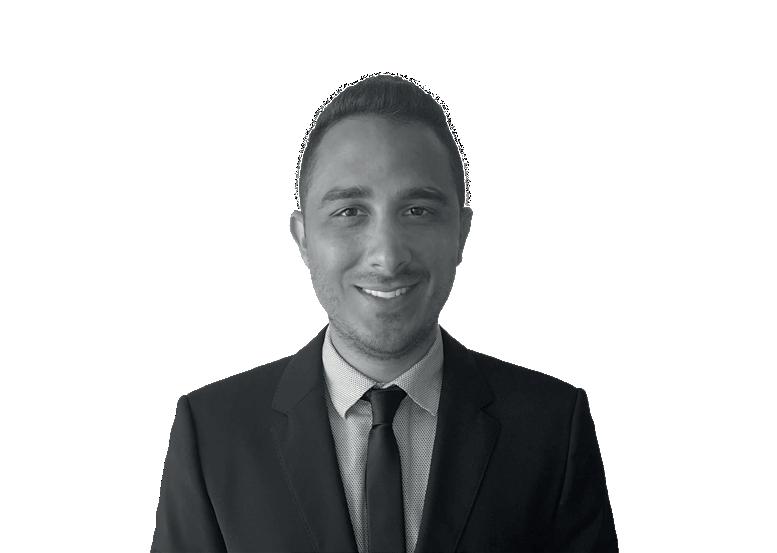
Mazen Najjar is VP of Prime Service Sales at Marex. Based in Dubai, he advises emerging hedge funds on regional and offshore frameworks and supports their growth with institutional-grade tools, execution, and strategic insight.


The key in the UAE is to start lean but credible. Investors here are highly sophisticated and expect infrastructure that reflects institutional standards, even at an early stage.
Mazen

Alex Gemici, CEO, Greenstone
The UAE has rapidly emerged as a crucial hub for global fund managers seeking to access new pools of capital. As the Middle East grows in both size and influence, the UAE’s strategic position in the global economy, combined with a flourishing private wealth sector, has made it an increasingly attractive market for investors to allocate capital.
The UAE has experienced remarkable growth in assets under management (AUM), driven by strong governmental initiatives and a thriving private sector. National priorities such as economic diversification and infrastructure development are attracting significant capital, both domestic and international. For global fund managers, this growth translates into broader
opportunities to raise capital from sophisticated investors eager to participate in global investment strategies.
The UAE’s economy has continued to grow steadily, supported by government investment across multiple sectors. Infrastructure development in key cities, such as Dubai and Abu Dhabi, has created a vibrant business environment. At the same time, a growing and youthful population is fueling entrepreneurial activity and expanding consumer markets. These dynamics make the UAE an increasingly important source of capital for fund managers operating internationally.


...the UAE’s strategic position in the global economy, combined with a flourishing private wealth sector, has made it an increasingly attractive market for investors...
Alex Gemici, Greenstone



While global fund managers may not be based in the UAE... [its] growing AUM, thriving economy, and expanding base of HNWIs and family offices make it a critical market for global managers.
Alex Gemici, Greenstone
In recent years, the UAE has seen a notable rise in high-net-worth individuals (HNWIs) and newly established family offices. Favorable tax policies, strong financial infrastructure, and ease of doing business have encouraged wealth growth and international investment. Family offices are increasingly allocating capital to global markets, while local HNWIs are active in private equity and venture capital. This expanding investor base provides fund managers access to sophisticated partners looking to diversify internationally.
By contrast, raising capital in the U.S. and Europe is becoming increasingly difficult. Denominator effects are prompting institutional investors to rebalance portfolios, while geopolitical and regulatory uncertainty adds further complexity. Many Western investors are focused on domestic opportunities, making the UAE and broader Middle East an increasingly
strategic region for fund managers seeking alternative sources of capital.
While global fund managers may not be based in the UAE, the country has solidified its position as a vital source of capital. Its growing AUM, thriving economy, and expanding base of HNWIs and family offices make it a critical market for global managers. As challenges in traditional markets increase, the UAE stands out as a hub of opportunity for investors and fund managers

Greenstone is an established institutional-grade capital raising firm in the Middle East and the leading provider of regulatory-compliant fund marketing and registration services in the GCC. Founded in 2011 and headquartered in the iconic Burj Khalifa in Dubai, Greenstone has deeply rooted local relationships with 200+ GCC-based institutional investors and 1,500+ GCCbased family office/UHNWI investors. Greenstone’s 90 professionals work with Greenstone’s global fund manager partners with aggregate AUMs of $700 billion. To find out more, visit www.

Christine Cairns, Partner, PwC
The United Arab Emirates has rapidly established itself as a premier destination for family offices, ultra-high-net-worth individuals, and global investment professionals. This transformation is not only reshaping the regional wealth management landscape but is also having a profound impact on the flow of talent and capital between the UAE and established financial centers such as the United Kingdom. Increasingly, the relationship between the UAE and the UK is characterised by a dynamic, two-way exchange of wealth, expertise, and investment.
The appeal of the UAE is rooted in a powerful combination of factors, not least its highly favorable tax regime which creates an environment exceptionally conducive to wealth preservation and growth. Even with the introduction of a 9% corporate tax in 2023, free zones and customized legal structures continue to offer significant tax efficiencies for international families and businesses.

The regulatory environment is equally compelling. The Dubai International Financial Centre (DIFC) and Abu Dhabi Global Market (ADGM) have developed robust legal frameworks modeled on international standards, providing a secure and transparent platform for wealth management. These frameworks are particularly attractive to UK-based family offices and investment professionals seeking familiar legal standards and regulatory certainty.
DIFC has rapidly established itself as a leading private wealth hub, highlighted by a 51% year-onyear increase in foundations to 671 as of 2024 and the management of an estimated USD 1.2 trillion in assets by 120 of the world's wealthiest families and individuals. The Centre is home to over 800 familyrelated entities and more than 410 wealth and asset management firms, including 75 hedge funds.
World-class infrastructure, a cosmopolitan lifestyle, and a strategic geographic location further enhance the UAE's attractiveness. Positioned at the crossroads of Europe, Asia, and Africa, the country

The appeal of the UAE is rooted in a powerful combination of factors, not least its highly favorable tax regime which creates an environment exceptionally conducive to wealth preservation and growth.
Christine Cairns, PwC

offers unparalleled connectivity for international business and investment, making it a natural partner for the UK in facilitating cross-border activity.
Recent years have seen a significant influx of ultra-high-net-worth individuals, family offices, and investment professionals to the UAE. An inflow of 9,800 global millionaires is projected in 2025, including a significant share of the 15,500 millionaires projected to leave the UK following changes to the UK non-domicile regime, placing the UAE as the top destination for millionaire migration. This migration is increasingly characterised by the establishment of operational family offices and investment vehicles. In fact, PwC estimates that 50% of UAE based family offices have been established since 2013, with this proportion set to grow.

growing client base.
Notwithstanding the outflow of wealth owners, the UK still remains a key destination for UAE-based investors and businesses seeking to internationalise their operations, access deep capital markets, and benefit from the UK's legal and financial infrastructure. The bilateral relationship is further supported by government initiatives and trade agreements aimed at fostering closer economic ties.
UK real estate, particularly prime commercial and residential assets, are particularly attractive to Middle Eastern family offices and sovereign wealth funds, in some cases at the expense of other European jurisdictions. London remains a consistent favorite, valued for its transparency, legal protections, and status as a global financial center. There is however also growing interest in regional cities, logistics hubs, and alternative asset classes.
The UK-UAE corridor is set to become an even more important nexus for international wealth, business and investment activity in the years ahead...
The number of private banks and wealth management firms relocating or setting up operations in the UAE reflects the growing demand for sophisticated financial services and the UAE's emergence as a regional wealth management hub. Notably, many of these new entrants are UKbased firms or have significant UK client bases, further strengthening the UK-UAE wealth corridor.
The UAE's rise as a wealth hub has significantly strengthened its connections with the UK. Many UKbased fund managers, family offices, and businesses are establishing a presence in the UAE to diversify operations, access new markets, and benefit from the region's tax and regulatory advantages. Both the DIFC and ADGM have reported a notable increase in registrations of UK-linked entities, and leading UK law firms, banks, and asset managers have expanded their operations in the UAE to serve this
Christine Cairns, PwC
This surge in cross-border investment is driven by real estate opportunities, favorable exchange rates, and the perceived safehaven status of the UK property market. At the same time, Middle Eastern investors are seeking to diversify their portfolios, hedge against uncertainties, and capitalize on long-term growth opportunities. UK-based advisors and service providers are increasingly working with UAE clients to facilitate these transactions.

As the links between the UK and UAE deepen, new opportunities for crossborder collaboration, investment, and business growth are emerging. The UK-UAE corridor is set to become an even more important nexus for international wealth, business and investment activity in the years ahead, offering mutual benefits and reinforcing both countries' positions as leading global financial centers.
Christine Cairns, Partner, PwC

Richard Aldridge, MENA and APAC Director, Black Swan Group
From a recruitment perspective, it is the Private Credit market that continues to gain significant traction across the GCC region, with DIFC and ADGM proving the local hot spots. A combination of investor appetite, economic diversification and a maturing regulatory framework have all fuelled this regional growth.
Sovereign Wealth Funds, Family Offices and Institutional Investors are drawn to the relatively higher returns and asset backed nature of such strategies, which is prompting firms to scale up teams in the region. In particular, we have seen a surge in demand for strong sales and origination roles in the GCC with funds raising fresh capital and LPs starting to see a return on investment, which will, in turn, begin to see new allocations being made over the coming years.
As the region continues to grow and mature in the Private Credit space the local talent pool (especially in the mid to senior market) still remains shallow. Sourcing from London, New York, Singapore and Hong Kong has to be balanced alongside suitable remuneration and drivers to entice candidates. To a large extent, the pull of DIFC and ADGM in the current macroeconomic environment is very attractive against the backdrop of global uncertainty and when combined with the UAE Vision 2030 – diversification, job creation and prioritising supporting dynamic SMEs – presents a very attractive option to globally motivated candidates.


From a recruitment perspective, it is the Private Credit market that continues to gain significant traction across the GCC region, with DIFC and ADGM proving the local hot spots.

Richard Aldridge, Black Swan Group


Senior Dealmakers, Sales and Originators – while the focus is still based on strong MENA relationships, in particular UAE and Saudi, we are seeing demand for US/Europe/APAC skillsets to relocate to the region to operate from within region focusing on respective markets
Legal and Structuring Professionals – strong familiarity with cross-border lending, ADGM/DIFC regulatory requirements and Shariah-compliant structures
Compliance officers – specifically with a mix of global and GCC experience are highly sought based on the global nature of international deal making
Investment Associates level experience at buy or sell-side firms
These specific skills alone in the current market will not be enough to make the move, the push for global talent alongside regional GCC experience, entrepreneurialism, and cross-cultural experience is highly prized. Strong financial modelling and deal execution experience should be taken as a ‘given’ alongside an understanding of regional legal frameworks.
According to a recent PWC report on Private Credit in the GCC region, there are parallels to be drawn between the growth of the APAC region around five years ago, which suggests we could see an annual increase of 15-30%. Such momentum is only likely to fuel a vibrant hiring market. Coupled with ADGM and DIFC actively supporting the sector to make it easier to setup and scale, and you have the ingredients for extraordinary growth. This is already evident, with major alternative players, including Brevan, Apollo, KKR and Blackstone accelerating their regional presence. Furthermore, the deal flow across the UAE and GCC, in particular Saudi, is increasing, with Private Credit cementing itself regional as a future platform for firms to grow their GCC

Richard Aldridge, MENA and APAC Director, Black Swan Group
Black Swan Group specialise in a cross section of specialisms in both traditional buy/sell side Financial Services, Fintech and Digital Assets operating globally having opened their Dubai office in 2024 - largely due to continued demand from their global client base. For further information on global relocation, intelligence or hiring requirements do contact richard. aldridge@blackswangroup.com or visit www. blackswangroup.com


The Financial Conduct Authority (“FCA”) is sharpening its focus on workplace culture with new rules that bring serious non-financial misconduct (“NFM”)—such as bullying, harassment, and violence—within the scope of regulatory oversight for all solo-regulated firms, including hedge funds.
Outlined in Consultation Paper CP25/18, the changes extend the Code of Conduct (“COCON”) to explicitly cover serious NFM, aligning non-bank firms with existing banking standards. The rules take effect from 1 September 2026, giving firms time to prepare.
What’s changing?
• COCON expansion: Serious NFM will now be treated as a breach of conduct rules, even if not financial in nature.
• Senior Managers: Must foster inclusive, respectful workplaces and may be held accountable for failing to address NFM.
• Certification staff: NFM will factor into fitness and propriety assessments.
• Conduct Rule staff: Misconduct must be “serious” to breach Rule 1 (integrity); otherwise, it may fall under Rule 2 (due skill, care, and diligence).
What’s in
• Workplace context: Only misconduct linked to regulated financial activities is covered under COCON.
• Private life: While outside COCON’s scope, serious personal misconduct may still affect fitness and propriety under the fit and proper regime (which affects fewer staff than COCON).
• Social media: Only relevant if posts indicate a real risk of future regulatory breaches.
Key considerations for Alternative Investment Firms
• Governance: Review and update internal policies, especially around complaints handling and workplace behaviour.
• Training: Ensure staff understand the new expectations and reporting obligations.
• Proportionality: The FCA expects firms to act, but in a way that reflects their size and risk profile.
These changes signal a broader cultural shift in regulation. For Alternative Investment Firms, early action can turn compliance into a strategic advantage—strengthening internal culture and reducing reputational risk.
In July 2025, the FCA, Prudential Regulation Authority (“PRA”) and HM Treasury released consultation papers proposing updates to the Senior Managers & Certification Regime (“SMCR”)—a framework central to individual accountability in UK financial services.
The FCA’s consultation CP25/21 outlines targeted reforms aimed at reducing regulatory friction while maintaining the regime’s core principles. These proposals are especially relevant for Alternative Investment Firms navigating SMCR compliance with lean operational structures. FCA proposals include:
• Streamlining Senior Management Function (“SMF”) approvals and digitising application processes;
• Extending validity of criminal record checks for SMF candidates;
• Improving flexibility around the 12-week rule for interim Senior Manager cover;
• Reducing duplication in Certification roles and clarifying annual Certification expectations;
• Simplifying reporting for Statements of Responsibilities and directory updates; and
• Raising thresholds for classification as an enhanced SMCR firm.
The FCA is seeking feedback by 7 October 2025, with final rules expected mid-2026.
In parallel, HM Treasury’s consultation proposes structural changes to the legislative framework underpinning SMCR. These would give regulators greater flexibility in defining and managing Senior Management Functions.
Proposed legislative changes:

• Removing the Certification Regime from statute, allowing regulators to tailor it more proportionately;
• Delegating pre-approval of certain senior roles to firms, reducing regulatory bottlenecks; and
• Empowering regulators to refine SMF definitions without legislative constraints.
This review also closes on 7 October 2025 and aligns with the UK’s broader Financial Services Growth and Competitiveness Strategy.

While the FCA’s current proposals represent a “phase 1” refinement, further changes may follow if HM Treasury’s legislative reforms are adopted. However, given strong industry support for SMCR’s principles, future revisions are expected to be incremental rather than transformational.

On 23 July 2025, the FCA published Market Watch 82 –the latest in its series on market conduct and transaction reporting issues.
Incorporating the regulator’s recent findings from supervising the UK Markets in Financial Instruments Directive (“MiFID”) transaction reporting regime, this newsletter recommends their integration into firms’ existing transaction reporting processes, breezily “not expect[ing] this to create any additional burden for firms.”
It primarily addresses firms subject to UK MiFID transaction reporting requirements, but also those subject to the UK European Market Infrastructure Regulation (“UK EMIR”) and the Securities Financing Transactions Regulation (“SFTR”). Some firms, apparently, displayed “persistent inefficiencies” and need to improve their operational frameworks, especially in these three areas:
1. Remedial timelines: the process by which firms address deficiencies in their transaction reporting data, systems or processes.
2. Back reporting: firms’ process for correcting inaccurate or incomplete transaction reports. Any delays hinder the FCA’s ability to recognise and investigate market abuse.
3. Breach notifications: the regulator distils its observations from reviewing 241 breach notifications in Q1, 2025 and advocates best practice.
Among its monitoring of transaction reporting data, the FCA’s Markets Reporting Team (“MRT”) closely monitors the quality of breach notifications. For more information, please see its transaction reporting page.
On 29 July 2025, the FCA fined Sigma Broking Limited (“Sigma”) £1,087,300 for failing to submit complete and accurate transaction reports over a five year period. In agreeing to resolve the case at an early stage, Sigma qualified for a 30% discount, without which the penalty would have been £1,553,300.
The FCA’s monitoring systems identified issues with transaction reports Sigma did submit and raised this with the firm in May 2023.
In January 2024, Sigma informed the regulator that c 984,000 incorrect reports had been submitted and in February 2025, after an independent review, confirmed


the number to be 924,584 - almost 100% of reportable transactions handled 1 December 2018-1 December 2023.
The failures were caused by faulty system setup and remained uncorrected due to weaknesses in Sigma’s reporting processes.
Sigma breached Article 26 of the UK Markets in Financial Instruments Regulation (“MiFIR”), the obligation to report transactions, and Principle 3 of the FCA’s Principles for Business, requiring firms to take reasonable care to organise
and control their affairs responsibly and effectively, with adequate risk management systems.
This is the second enforcement action against Sigma for inadequate transaction reports.
It is also the second enforcement action for breach of transaction reporting requirements in the UK MiFIR legislation, the first being against Infinox Capital Limited in January 2025.
In August 2024, the FCA reported an enforcement and public redress exercise against asset manager H2O AM LLP (“H2O”).
The following year, on 25 July 2025, the FCA announced it had fined the company’s deputy CEO, Jean-Noel Alba, £1,049,500 and banned him from financial services for lack of integrity, because he had misled it, and had failed to be open and co-operative in their interactions.
Between April 2015 and November 2019, H2O failed to conduct adequate due diligence on investments from the Tennor Group of companies owned by Lars Windhorst, or companies he introduced. The investments were high risk and hard to sell, leaving investors trapped. In 2024, the FCA agreed that H2O would pay those investors €250 million.
During the investigation, Mr Alba was the FCA’s principal point of contact. He provided the regulator with false and misleading statements and documentation. In the absence of formal meetings, Mr Alba required junior colleagues to fabricate minutes, including records and minutes of committees. He also provided “due diligence materials”, like investment research, which were purportedly contemporaneous, but had in fact been created years after the investments were made.
The US Department of the Treasury’s Financial Crimes Enforcement Network (“FinCEN“) on July 21, 2025 announced its intent to delay the effective date of the AntiMoney Laundering/Countering the Financing of Terrorism (“AML/CFT“) rule for Registered Investment Advisers and Exempt Reporting Advisers (“IA AML Rule“) from January 1, 2026, to January 1, 2028.
Key Highlights
• Effective Date Postponed: The IA AML Rule’s implementation date is now expected to shift from January 1, 2026 to January 1, 2028.
• Broader Review Underway: FinCEN will reassess the scope of the rule to ensure it is appropriately tailored
to varying business models and risk profiles within the investment adviser sector.
• Exemptive Relief Anticipated: Regulatory certainty will be maintained during this period through exemptive relief measures.
• Additional Rule Reassessment: FinCEN, in collaboration with the Securities and Exchange Commission (“SEC”), also plans to revisit the proposed Customer Identification Program rule requirements for investment advisers.
In September 2024, FinCEN adopted the IA AML Rule that

broadens the definition of “financial institution” under the Bank Secrecy Act (“BSA”) to include registered investment advisers (“RIAs”) and exempt reporting advisers (“ERAs”). The rule requires RIAs and ERAs to establish an AML/CFT program and file certain reports.
The BSA was created to address gaps in the current regulatory framework to combat AML/CFT.
As currently drafted (albeit subject to change), the IA AML Rule primarily requires covered investment advisers to:
• Implement and maintain a written AML/CFT program, including designating an AML/CFT compliance officer, implementing policies, procedures and controls and conducting ongoing customer due diligence;
• File Suspicious Activity Reports (“SARs”) and Currency Transaction Reports (“CTRs”); and
• Maintain certain records, including records of compliance with the BSA’s requirements, records
Presented by

related to SARs, and records related to fund transfers of $3,000 or more.
The IA AML Rule exempts RIAs who register solely because they are mid-sized advisers, multi-state advisers, pension consultants or have no assets under management on their Form ADV.
For covered advisers with their principal office and place of business outside the US, the IA AML Rule only applies to activities within the US or providing services to a US person or a foreign located private fund with an investor that is a US person.
This postponement offers breathing space for firms to prepare, plan and assess AML/CFT obligations with greater clarity. While formal requirements are delayed, the risk landscape continues to evolve, and a proactive approach to safeguarding compliance operations should be encouraged.

On August 15, 2025, The Securities and Exchange Commission (“SEC”) announced charges against a New York-based registered investment adviser, for breaches of fiduciary duty regarding management fee calculation practices for its private fund clients related to compensation it received from portfolio companies. To settle the charges, the firm agreed to pay more than $680,000 in monetary relief and to conduct a distribution to harmed investors.
According to the SEC’s order, the firm provided investment advisory services to private funds, each of which was governed by a limited partnership agreement ("LPA"). The LPAs allowed the firm to receive management fees from the funds, as well as transaction fees from portfolio companies, but required that the firm credit back to each fund a portion of the transaction fees to reduce or offset the management
fees the funds owed to the firm. The order finds that, from October 2018 through November 2023, the firm breached its fiduciary duty to the funds by engaging in two fee offset calculation practices related to its receipt of transaction fees that created conflicts of interest that were not adequately disclosed to the funds or their limited partners ("LPs") and were inconsistent with the relevant LPAs. First, the order finds that the firm failed adequately to disclose that it received interest on deferred transaction fees from five portfolio company investments and did not include those amounts in the corresponding fee offsets. Second, the order finds that, for at least one portfolio company investment in which multiple funds invested, the firm improperly duplicated transaction fee reductions when calculating certain fee offsets. The order finds that the firm charged the funds more
than $500,000 in excess management fees as a result of these practices.
The firm consented to the entry of the SEC’s order finding that it violated Section 206(2) of the Investment Advisers


Act of 1940. In addition to a cease-and-desist order and censure, the firm agreed to pay $508,877 in disgorgement and prejudgment interest and a $175,000 civil penalty and was ordered to conduct a distribution to harmed LPs.
The Securities and Exchange Commission on August 14, 2025 charged an Indiana-based portfolio manager for violating his fiduciary duty by investing his private fund client in a fraudulent scheme. Separately, the SEC has also charged the operators of the fraudulent scheme.
The SEC alleges more than $165 million was raised, primarily from retail investors, by offering and selling investment contracts in which investors supposedly purchased water machines that would generate revenues. In reality, these machines did not exist or had already been sold to other investors. In a second, related scheme, more than $110 million was raised from institutional investors through the issuance of notes purportedly secured by water machines.
The SEC’s complaint against the portfolio manager is that he violated his fiduciary duty when directing his private fund client to purchase the notes without disclosing his significant personal investment in the business. He also failed to act in the client’s best interests by causing it to substantially increase its investments in the notes despite red flags that some of the purported water machine collateral may have been fabricated.
In a parallel action, the US Attorney’s Office for the Southern District of New York on the same day announced criminal charges against the portfolio manager and the individual operator of the schemes.
Click here to subscribe to The Alternative Investor; or if you have a question about the publication or a suggestion for a guest article email the team at hello@alternativeinvestorportal.com

Brodie Consulting Group is an international marketing and communications consultancy, focused largely on the financial services sector. Launched in 2019 by Alastair Crabbe, the former head of marketing and communications at Permal, the Brodie team has extensive experience advising funds on all aspects of their brand, marketing and communications.
Alastair Crabbe Director
Brodie Consulting Group
+44 (0) 778 526 8282 acrabbe@brodiecg.com www.brodiecg.com www.alternativeinvestorportal.com

Capricorn Fund Managers Limited is an investment management and regulatory hosting business that provides regulatory infrastructure and institutional quality operational, compliance and risk oversight. CFM is part of the Capricorn Group, an international family office, which has been involved in alternative assets since 1995. Presented
Jonty Campion
Director
Capricorn Fund Managers
+44 (0) 207 958 9127
jcampion@capricornfundmanagers.com www.capricornfundmanagers.com

RQC Group is an industry-leading crossborder compliance consultancy head-officed in London with a dedicated office in New York, specializing in FCA, SEC and CFTC/NFA Compliance Consulting and Regulatory Hosting services, with an elite team of compliance experts servicing over 150 clients, and providing regulatory platforms to host over 60 firms.
United Kingdom: +44 (0) 207 958 9127 contact-uk@rqcgroup.com
United States: +1 (646) 751 8726 contact-us@rqcgroup.com www.rqcgroup.com
Capricorn Fund Managers and RQC Group are proud members of

Alastair Crabbe acrabbe@brodiecg.com
Darryl Noik dnoik@capricornfundmanagers.com
Jonty Campion jcampion@capricornfundmanagers.com
Lynda Stoelker lstoelker@capricornfundmanagers.com
James Bruce jbruce@capricornfundmanagers.com

Visit www.alternativeinvestorportal.com to


